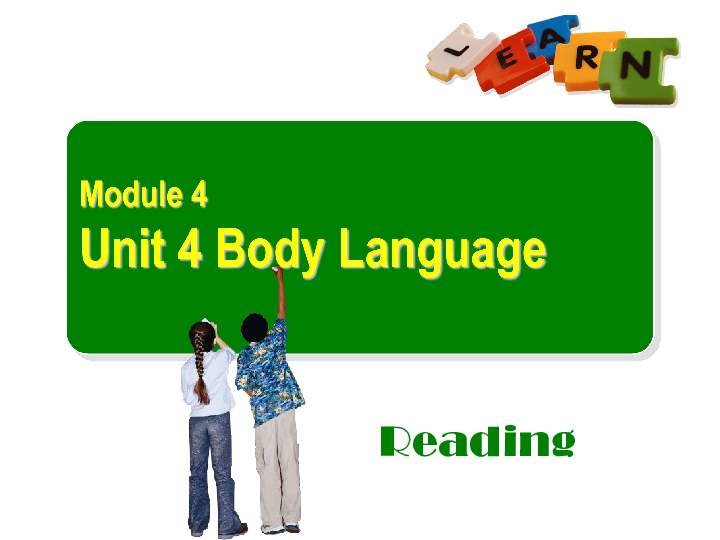(
课件网) Module 4 Unit 4 Body Language Reading Why do we need body language? She is deaf and dumb, so body language plays a very important part in her life. what can you predict from the title? Communication: No problem? Reading Match the right main idea of each part. I went to the Airport to meet the international students. People from different countries have different body language. Summary of body language. Part 1 (Para. 1) Part 2 (Para. 2-4 ) Part 3 (Para. 5 ) A B C Do all students greet each other in the same way ? How many international students are mentioned in the passage? Who are they? Six students. Tony Garcia, Julia Smith, Akira Nagata, George Cook, Ahmed Aziz, Darlene Coulon No, they don’t. Where are they from? Jordon Colombia Britain Japan Canada France Detailed reading : Para1 When: _____ Where: _____ What to do: _____ yesterday the Capital International Airport Went to meet international students How did I spot the people I was waiting for? I saw several young people enter the waiting area looking around curiously. translation Find out the two cultural mistakes in Para2: Tony Garcia Julia Smith The first mistake (Columbia ) (Britain) He approached Julia, _____ _____ _____and _____ her on the _____. She _____ _____ appearing _____ and put up her hands, as if ___ _____. shoulder touched her kissed cheek stepped back surprised in defence The second mistake Akira Nagata (Japanese) George Cook (Canada) He _____ his hand _____ to the Japanese student. He _____ so his nose _____George’s _____ _____. bowed touched moving hand reached out Is the writer male or female? How do you know? Male. Because Ahmed Aziz only shakes hands with men. Para3: men from Muslim countries To men: To women: stand close, and shake hands nodding translation Englishmen often stand close to others or touch strangers as soon as they meet. Most people around the world now greet each other by shaking hands . Japanese will bow to others as greeting. Members of a culture behave in the same way. Body language in some countries is good while some in others is bad. True (T) or False (F). T F F F T Para4&5: translation Body language is very important in our daily life, and it may vary from different cultures. When we are visiting other countries, we should follow their customs. That is to say, _____. What can you learn from this passage? The Maori in New Zealand touch noses to greet people. In Vietnamese culture, only parents or a high-ranking person can touch your head. A Bulgarian nods to mean “no” and shakes his head from side o side to mean “yes”. …… 1. 至少再读一次文章,划出重难点; 2. 完成第5期周报(2天),并做好订正,全班交。

